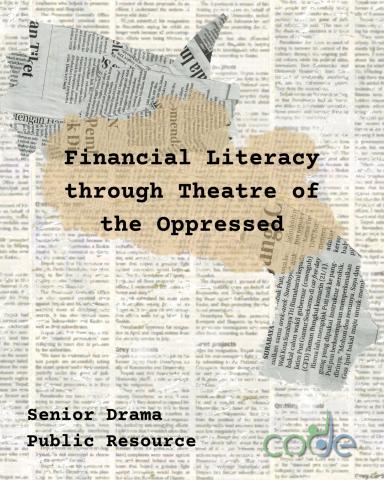Note: As CODE's Financial Literacy writing project took place in 2011, they do not currently align with the Ontario Math curriculum expectations for Financial Literacy. The revision of these resources for better alignment is a priority for CODE's resource revisions.
Unit Overview

This senior Dramatic Arts unit is designed as an introduction to the issues of Power, Wealth, Poverty and Social Location and explores personal assumptions about these ideas using Theatre of the Oppressed techniques. Students explore a variety of assumptions about the make-up of wealth/poverty and apply their understandings using dramatic techniques to make personal connections to their own futures. A focus on compassionate awareness and critical thinking leads students to explore how social location intersects with a person's access to financial wellness. This introductory unit encourages a diverse approach through a variety of drama courses by addressing specific and overall expectations unique to each course.
Students use techniques of Theatre of the Oppressed (e.g. Newspaper Theatre, Image Theatre) self-reflection, in-role writing and group discussion to explore issues of power, wealth, poverty and social location.
Teacher Note
It is important when exploring topics of a sensitive nature (such as financial hardship) to know your students and establish a safe environment for learning. Be aware that some students may be experiencing these issues in their real life. Avoid forcing personal disclosures and establish distancing techniques to establish safety in role (the right to pass, the freedom to choose characters and scenarios that are comfortable for them to explore). This unit may also open up sensitive discussions around issues of poverty related to race, class, gender and other identities.
See CODE's Addressing Oppressions resource hub for suggestions to expand your own knowledge or to support student learning.
Unit Guiding Questions
- What is poverty?
- What is wealth?
- What is power?
- What is social location?
- How can these factors affect a person's financial situation?
- What are my assumptions of power, wealth, poverty, and happiness?
- How can my assumptions be changed about power, wealth, poverty and happiness?
Assessment and Evaluation: How will students demonstrate their learning?
Assessment for Learning (AfL)
Lesson 1 - Teacher observation, Group discussion, Review of student exit cards
Lesson 2 - Teacher observation, Group discussion, Oral questioning
Assessment as Learning (AaL)
Lesson 1 - Group discussion, Brainstorming, Use of word wall, Creative application through tableaux and choral speaking/chanting, Peer feedback of performances, Exit card writing
Lesson 2 - Group discussion, Peer feedback of performances, Journal writing
Lesson 3 - Group discussion, Peer feedback of Image Theatre, Exit card review and rewrite
Assessment of Learning (AoL)
Lesson 3 - Observation, Group discussion
Unit Lessons: How will assessment and instruction be organized for learning?
Lesson
Focus
Lesson 1 - Assumptions
Students explore their own and others’ beliefs about wealth and poverty. By questioning the nature of poverty, students consider their own beliefs, biases and assumptions.
Lesson 2 - Power and Social Location
Students work with concepts of status and power using Newspaper Theatre techniques.
Lesson 3 - Image Theatre
Students draw on their learning from the previous two lessons to create Image Theatre pieces that unpack issues related to wealth, poverty, power and social location.
